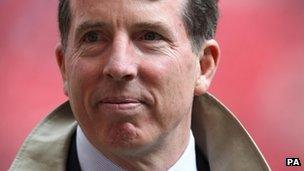Barclays fined for attempts to manipulate Libor rates
- Published

Chief executive Bob Diamond will give up his bonus for this year - last year it was £2.7m
Barclays has been fined £290m ($450m) for trying to manipulate a key bank interest rate which influences the cost of loans and mortgages.
Its traders lied to make the bank look more secure during the financial crisis and, sometimes - working with traders at other banks - to make a profit.
Barclays said the actions "fell well short of standards". Chief executive Bob Diamond is to give up his bonus.
The Financial Services Authority is now looking into other banks.
The matter is also being investigated in the US, where the Department of Justice said criminal investigations into "other financial institutions and individuals is ongoing".
The penalties from the UK financial watchdog and <link> <caption>US authorities</caption> <url href="http://www.justice.gov/opa/pr/2012/June/12-crm-815.html" platform="highweb"/> </link> followed "serious and widespread" misconduct, <link> <caption>said the FSA.</caption> <url href="http://www.fsa.gov.uk/library/communication/pr/2012/070.shtml" platform="highweb"/> </link>
The fine is part of an international investigation into the setting of interbank rates between 2005 and 2009.
It seems highly likely that other banks, and in other countries, will face similar sanctions to that of Barclays.
"The FSA continues to pursue a number of other significant cross-border investigations in this area and the action we have taken against Barclays should leave firms in no doubt about the serious consequences of this type of failure," the UK regulator said.
Three other Barclays executives will also give up their annual bonus this year.
Although they and Mr Diamond were not involved in the manipulation attempt, a Liberal Democrat peer has called on Mr Diamond to stand down.
Lord Oakeshott told the BBC: "If he had any shame he would go. If the Barclays board has any backbone, they'll sack him."
Barclays' misconduct relates to the daily setting of the London Interbank Offered Rate (Libor) and the Euro Interbank Offered Rate (Euribor).
These are two of the most important interest rates in the global financial markets and directly influence the value of trillions of dollars of financial deals between banks and other institutions.
They can also affect lending rates to the public, for instance, with some mortgage deals.
But it is not yet clear whether Barclays staff had succeeded in manipulating the interest rates to the bank's advantage and therefore whether it had any impact on borrowers. While the FSA said only that the Barclays employees had attempted to do so, the US Department of Justice said that on some occasions they did affect the Libor and Euribor rates.
But even so, Tracey McDermott, director of enforcement at the FSA, told the BBC such behaviour was still "completely unacceptable".
"Libor is an incredibly important benchmark reference rate, and it is relied on for many, many hundreds of thousands of contracts all over the world," she said.
"And the market needs to have confidence that those who are involved in submitting numbers to set Libor are thinking about the integrity of the market, and confidence in the market, and not their own interests."
'Accepted culture'
Each day the British Bankers' Association and the European Banking Association publish the the Libor and Euribor rates by taking an average of the estimated rates submitted to them by leading banks.
Between 2005 and 2008, the Barclays staff who submitted estimates of their own interbank lending rates were frequently lobbied by its derivatives traders to put in figures which would benefit their trading positions, in order to produce a profit for the bank.
And between 2007 and 2009, during the height of the banking crisis, the staff put in artificially low figures, to avoid the suspicion that Barclays was under financial stress and thus having to borrow at noticeably higher rates than its competitors.
Tracey McDermott, director of enforcement at the FSA, says the misconduct is some of the most serious it has ever seen
The FSA pointed out that Barclays traders were quite open in their routine attempts to lobby their colleagues who submitted the bank's estimate of its borrowing costs to the BBA.
It was particularly concerned because it appeared to be "accepted culture" amongst some staff.
"Requests to Barclays' submitters were made verbally and a large amount of email and instant message evidence consisting of derivatives traders' requests also exists," the FSA said.
In one instance, a trader recounted a conversation in which he had "begged" the submitter to put in a lower Libor figure.
"I'm like, dude, you're killing us," he said. His manager replied, "just tell him to... put it low".
In turn, the staff submitting the data would respond to the traders' requests.
"For you…anything," said one. "Done… for you big boy," said another.
And: "I owe you big time... I'm opening a bottle of Bollinger."
Both UK and US authorities were also critical of Barclays' lack of internal controls over its system of submitting information on Libor and Euribor.
This, along with inadequate supervision of trading desks, "allowed this conduct to occur", US regulators said.